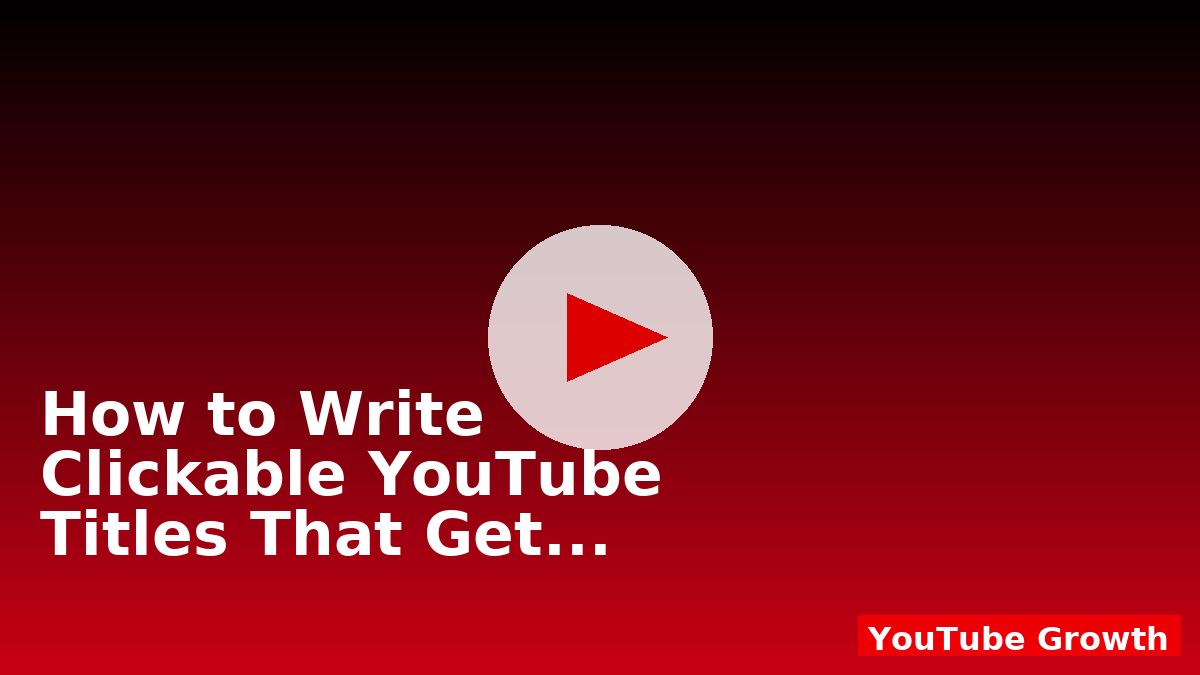
By vsfur · Updated · 10–14 min read
The Psychology of Getting More YouTube Subscribers
Affiliate disclosure: Some links are affiliate. If you sign up via , we may earn a commission at no extra cost to you.
The Psychology of Getting More YouTube Subscribers focuses on aligning what viewers want with what the platform rewards: satisfaction, retention, and session time. Use this field-tested playbook to plan, package, and deliver uploads that reliably earn clicks and keep people watching.
Key Takeaways
- Clarity in packaging outperforms cleverness.
- Retention is the strongest growth lever.
- Consistency compounds—publish weekly.
- Measure CTR, AVD, average % viewed, and returning viewers.
- Iterate from data, not guesses.
Topic-Specific Notes
- Use commitment triggers: series, progress bars, and 'next episode' hooks.
- Make subscribing the logical next step after delivering a meaningful win.
Related reads: Clickable Titles • Analytics Explained • Scripting .
Research demand and intent using auto‑suggest, search results, and competitor libraries. Collect exact phrasing your audience uses and build a swipe file of promising titles.
Craft a compelling promise. Your title and thumbnail should communicate a concrete outcome in simple language. Avoid vague superlatives unless the video genuinely proves them.
Engineer the first 30 seconds. State the outcome upfront, preview the steps, and remove long intros or logo animations. Viewers decide to stay or bounce in seconds—respect their time.
Structure for retention. Use mini‑hooks every 30–45 seconds, add pattern breaks, and interleave visuals with narration. Deliver small payoffs on the way to the big payoff.
Edit for clarity and pace. Cut redundancy, tighten pauses, and sync b‑roll to narration. Level audio, remove noise, and ensure captions are readable on mobile.
Package for the click. Draft 2–3 title options and 2 thumbnail concepts. Choose clarity over cleverness; promise one thing and deliver exactly that.
Publish and promote with context. Share in relevant communities with a summary of the value first. Respect the rules and culture of each platform.
Iterate from analytics. Study retention dips, traffic sources, and end-screen performance. Double down on videos that produce strong watch time from Browse or Suggested.
Examples & Case Snapshot
Example title formulas you can adapt include: “I tried {tool} for 30 days — results”, “7 mistakes stopping your {niche} growth”, and “How I went from 0 to 1,000 in 60 days”. In a recent education channel, simplifying thumbnails to one face, one object, and 2–3 words doubled CTR from 3.4% to 6.1% while trimming a 25‑second cold open to 7 seconds improved retention.
Advanced Techniques
Design your uploads to earn session time. Link to a relevant next video, reference playlists mid‑video, and place end screens during the final 20 seconds with a single, obvious next step. When viewers continue watching, your future videos are more likely to be recommended.
Batch production speeds output. Outline three videos at a time, record them in one session, and capture thumbnail photos while the setup is still live. Small systems yield big gains over a month.
Common Mistakes
- Topics too broad for your niche, confusing the algorithm.
- Clickbait that breaks trust and hurts satisfaction signals.
- Inconsistent posting that kills momentum.
- Ignoring audio quality—viewers forgive average visuals, not muddy sound.
- Skipping analytics reviews and guessing what worked.
Tools & Resources
- Keyword & competitor research: vidIQ
- Recording: OBS, Loom, phone + lav mic
- Editing: CapCut, DaVinci Resolve, Premiere Pro
- Design: Figma, Canva
- Organization: Notion or Google Sheets
SEO Checklist
- Target a primary keyword + 2–3 support terms in natural language.
- Place the promise early in the title; avoid redundancy between title and thumbnail.
- Use chapters, captions, and a detailed description with resources.
- Pin a comment with the next video to watch.
- Add to a playlist and reference it in-video.
Action Plan
For the next four weeks: publish one video weekly, test two title/thumbnail options, and document results in a simple tracker. Build a chain of related videos that point to each other to increase session time.
FAQs
How often should I upload as a beginner? Start with one quality upload per week. Consistency matters more than bursts. Increase only when you can maintain quality.
What is a good CTR? It varies by traffic source; for Browse 4–10% is common. Focus on clarity in the promise and matching thumbnail to title.
Should I start with Shorts or long-form? Do both. Shorts accelerate discovery; use them to point to a related long video that builds deeper relationship.
When should I pivot my niche? If after 8–12 uploads the audience isn’t responding and analytics show weak interest, consider niching down or reframing your promise.
How long should my videos be? As long as they remain engaging. Many beginner‑friendly videos land between 6–12 minutes with clear structure.
Do tags still matter in 2025? They help with minor disambiguation, but titles, descriptions, thumbnails, and viewer satisfaction matter far more.
How do I know if a video is a keeper? Look for strong relative retention and growing Browse/Suggested traffic after 48–72 hours. Create sequels to verified winners.
Conclusion
Growth is a system: research → packaging → delivery → analytics → iteration. Apply the loop to your next three uploads, review results without ego, and keep what works. Progress compounds quickly when you ship consistently.